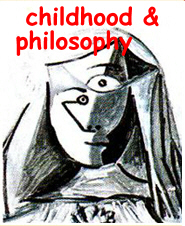question-machines
Abstract
Deleuze and Guattari affirm in a Thousand Plateaus that children's questions are mis-understood if they are not comprehended as question-machines (Mil Platôs, 1997, p. 42). Question-machines are understood as questions that uncoil in problems and that pursue a fundamental question that is not resolved and that remains throughout all answers. What can we do with the question-machines that children make? Do we answer them? Do we use them to proliferate more questions in philosophical dialogues? How can we use group dialogues to generate other possibilities of thinking? Should we drive students to a solitary space, as suggested by Deleuze´s example of the professor of the Abecedaire in the letter “p”, instead of just promoting other dialogues? One who knows and speaks too much impedes thought instead of promoting it because many times continuous speaking, without pauses, without interruptions, without the silences that summon something new, prevent something that in the end is worth saying. How can we guarantee then, in a philosophy class with children, moments other than just conversations; moments that promote different opportunities of expression, of thought, of problematizing? Key words: Philosophy; childrens; Gilles DeleuzeDownloads
Download data is not yet available.
Downloads
Published
2010-04-27
Issue
Section
articles




